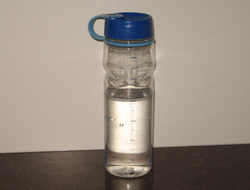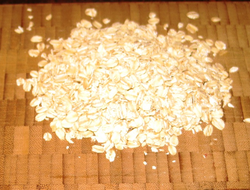Macronutrients and Health
Published: March 20, 2020
Macronutrients include water, fat, protein and carbohydrate and are components of your body and the food you eat.
Fat, protein, and carbohydrate provide you with energy and a also have a variety of other functions in your body.
Although water has no energy value it is an important dietary nutrient and essential to life.
These macronutrients are described below in terms of a healthy body composition and dietary requirement.
Water
Water constitutes about 60% of a healthy body, and you cannot survive without a regular and adequate supply of water.
Almost all of your body's internal activities take place in a water based environment.
Water is necessary for your body's metabolic reactions such as transporting essential substances to cells and removing waste and potentially toxic substances out of your body.
The amount of water you need depends on your gender, level of physical activity, and the temperature of your environment.
You can obtain the water that you need from foods and beverages.
However, some beverages, such as alcohol, may result in increased fluid losses from your body. Other beverages are sources of sugar and energy.
Water or fluid requirement varies between 2-3 L/day depending on age, gender and activity level.
Fat
Fat is the second major component of a healthy body at about 13 -30 % of total body weight.
Within your body, fat is used to provide energy for your body's many metabolic reactions and also provides insulation and cushioning.
There are many different types of fat (lipids) found in your body and as well as providing energy they have several different functions.
Your body can synthesize most fatty acids.
However, there are two essential fatty acids, omega-3 and omega-6 fatty acids, which your body cannot make, but which can be obtained from the foods that you eat.
In a healthy diet, fat provides between 20%-35% or your daily energy requirement. Dietary fat can be sourced from plant and animal foods.
Protein
In a healthy body, protein represents between 10 -17% of body weight.
All proteins are composed of amino acids.
Your body uses amino acids acquired from dietary protein (and from within your body) to synthesise proteins that build muscle tissue, skin, hair, bone.
Your body also synthesises hundreds of other types of proteins within your body which allow your body to function.
Protein can be obtained from a wide variety of food sources such as meat, poultry, fish, eggs, dairy products, legumes, soy, grains, nuts, seeds, and vegetables.
The recommended protein intake for adults is 0.8 -1.0 g/kg of body weight per day. Children, adolescents and very active people require slightly more protein relative to body weight.
Carbohydrate
In comparison to water, fat and protein, carbohydrate is only present in your body in relatively small amounts.
Storage of carbohydrate (glucose as glycogen) is limited as glycogen holds water and is bulky.
About one third of glucose is stored in your liver and the remainder is stored in your muscle cells.
Since glucose is a primary source of energy for your body, and body stores of glucose are mostly depleted during your overnight fast, dietary carbohydrate is a necessary source of glucose for your body.
]Dietary carbohydrates are categorised as simple carbohydrates (sugars) and complex carbohydrates (starches and fibres).
All of the cells in your body use glucose as an energy source so you need to refuel with glucose every day.
The average person requires about 130 g/day of glucose to meet their energy requirements.
In a healthy diet, carbohydrate provides between 45% - 65% of your daily energy requirement.
Eating Well
Individually, macronutrients do not provide you with all the nutrients that you need for a healthy and fully functioning body.
Micronutrients, such as vitamins, minerals, phytochemicals, and antioxidants are required in much smaller amounts measured in milligrams or micrograms.
Macronutrient requirement is measured in grams.
Comsuming adequate amounts of macro and micronutrients is essential for eating for health.
References
1.
Whitney, E. & Rady Rolfes, S. (2005). Understanding Nutrition. Belmont, CA: Thomson Wadsworth
2.
Gropper, S.S., Smith, J.L. & Groff, J.L. (2005). Advanced Nutrition and Human Metabolism (4thEd.). Belmont, CA: Thomson Wadsworth.




